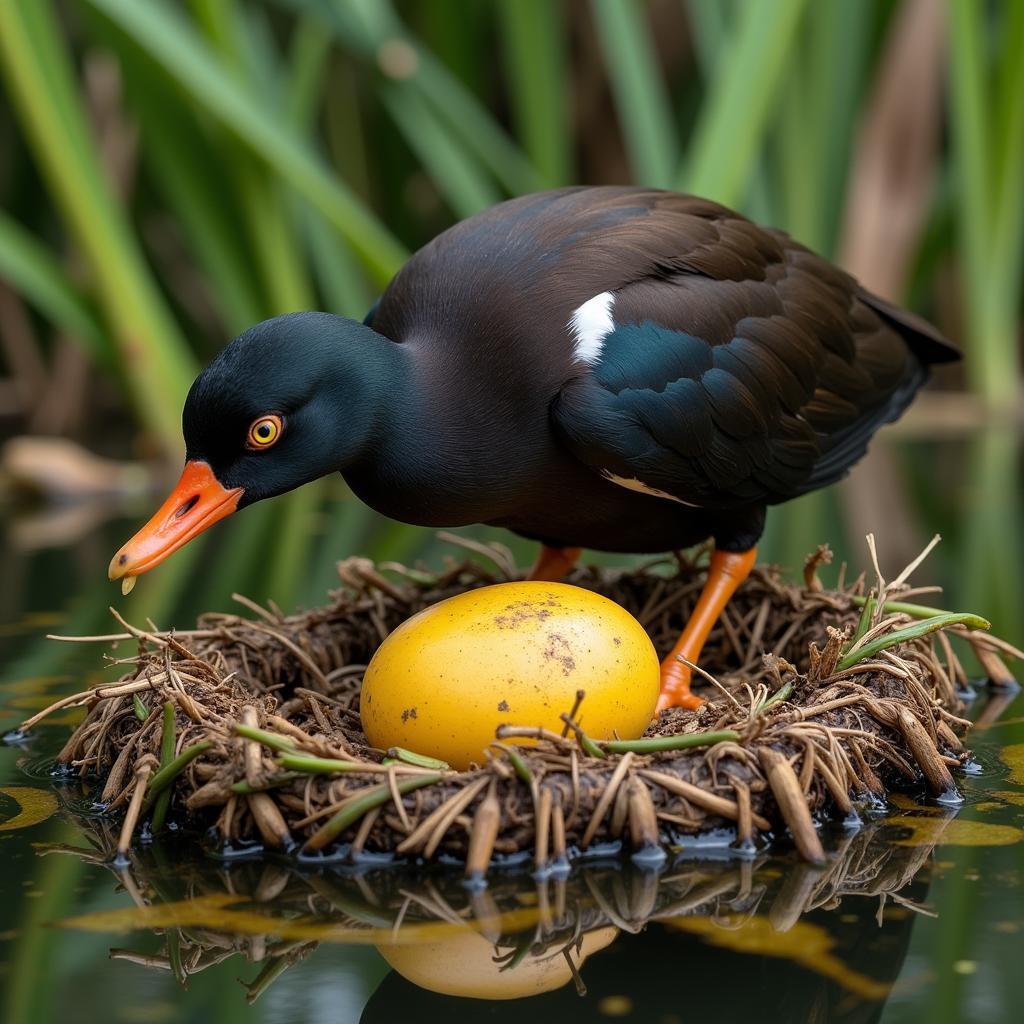African Jacana Parental Care: A Role Reversal in the Avian World
The African Jacana, a striking bird found in sub-Saharan wetlands, captivates more than just the eye with its vibrant plumage and elongated toes. This species offers a fascinating glimpse into a world of reversed gender roles, where males take center stage in parental care, showcasing the remarkable diversity of nature’s strategies.
Redefining Traditional Roles: Male African Jacanas as Primary Caregivers
In a stark departure from the conventional avian script, African Jacana males shoulder the lion’s share of parental responsibilities. From nest building and incubation to chick rearing and protection, these devoted fathers redefine traditional gender roles, leaving females to navigate the complexities of polyandry and territorial defense.
 Male African Jacana Incubating Eggs
Male African Jacana Incubating Eggs
“The dedication of male African Jacanas to their offspring is truly remarkable,” notes Dr. Abena Owusu, an ornithologist specializing in avian behavioral ecology. “They exhibit an unwavering commitment to their paternal duties, ensuring the survival of their young in the face of environmental challenges.”
A Closer Look at Paternal Duties: From Nest to Fledgling
Nest Building and Incubation: A Shared Responsibility with a Male Bias
While both sexes contribute to nest construction, a task involving the collection of aquatic vegetation to form a floating platform, males often take on a more active role. Once the nest is deemed suitable, the female lays a clutch of typically four eggs, and incubation, lasting around 25 days, becomes the sole responsibility of the male.
Chick Rearing: A Father’s Unwavering Devotion
Upon hatching, African Jacana chicks, precocial and capable of independent feeding, rely on their father for protection and guidance. The male shelters them under his wings, keeping them warm and safe from predators, and diligently leads them to foraging grounds, teaching them to navigate their watery world.
Protection from Predators: A Father’s Courage
The African Jacana’s wetland habitat teems with potential predators, from snakes and monitor lizards to birds of prey. Male jacanas, ever vigilant, employ a range of defensive tactics, including distraction displays and aggressive attacks, to safeguard their precious brood.
The Evolutionary Puzzle: Why the Role Reversal?
The intriguing question of why African Jacanas exhibit such pronounced sex role reversal has puzzled evolutionary biologists for decades. Current hypotheses suggest that this behavior is driven by a complex interplay of factors, including:
- High Predation Pressure: The precarious nature of the jacana’s wetland habitat, coupled with the vulnerability of eggs and chicks, may have favored the evolution of males as primary caregivers, allowing females to conserve energy for egg production and territorial defense.
- Polyandry and Female Competition: Female African Jacanas often mate with multiple males, a strategy that may increase reproductive success but also intensifies competition among females for mates and territories. This competition may have led to the evolution of larger, more aggressive females, freeing males to focus on parental care.
African Jacana Ship: A Testament to Nature’s Diversity
The African Jacana’s unique approach to parental care serves as a testament to the remarkable diversity of life strategies found in nature. By challenging conventional notions of gender roles, this species offers valuable insights into the evolutionary forces shaping animal behavior and the remarkable adaptations that allow species to thrive in diverse ecological niches.
FAQs about African Jacana Parental Care
1. Why do female African Jacanas lay multiple clutches?
Female African Jacanas employ a strategy known as polyandry, mating with multiple males and laying several clutches throughout the breeding season. This approach maximizes reproductive output and ensures genetic diversity among offspring.
2. How do male African Jacanas recognize their own chicks?
While the exact mechanisms remain unclear, it’s believed that male African Jacanas rely on a combination of visual and auditory cues to distinguish their own chicks from those of other males.
3. What threats do African Jacanas face?
Habitat loss due to wetland drainage and degradation poses a significant threat to African Jacana populations. Additionally, pollution, climate change, and the introduction of invasive species further impact these birds and their fragile ecosystems.
For further insights into the fascinating world of African Jacanas, explore our article on the “African Jacana ship,” which delves into the intricacies of their polyandrous mating system.
Need help planning your next adventure to witness the wonders of African wildlife? Contact us!
Phone: +255768904061
Email: kaka.mag@gmail.com
Address: Mbarali DC Mawindi, Kangaga, Tanzania.
Our dedicated customer support team is available 24/7 to assist you.
